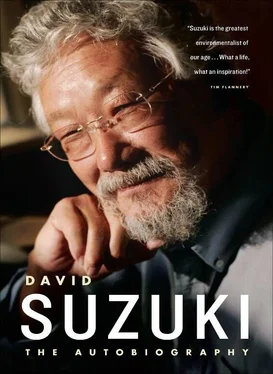The foundation moved on with its many other projects, but Tara and I had made friendships and developed relationships that continue today and that we will cherish for our lifetimes.
A POSTSCRIPT LED TO one of the most painful episodes of my adult life. When the David Suzuki Foundation agreed to complete independence for Turning Point from our list of projects, the major funder of that initiative expressed a reluctance to transfer its funds directly to Turning Point. We had worked closely with the Lannan Foundation for years, but Turning Point was a newly independent organization without a track record; the funder wanted to continue contributing through DSF. We would be responsible for how those funds were used by Turning Point. Jim knew this was not wise and asked the funder to give directly to Turning Point, but this was not an option. Reluctantly, we agreed to handle the funds and carry out “due diligence” with Turning Point.
When we initially set ourselves up as a double-barreled organization in 1991, the project-based institute arm had chafed under the limits imposed by the fund-raising foundation arm. Now DSF staff found themselves in the position of being like the hated government “Indian agents” of the past, giving the money but making Turning Point jump through hoops as required by Revenue Canada.
Unfortunately, we were in the midst of the long, drawn-out federal audits of every dime of our spending that have plagued us in recent years and cost the DSF over $100,000. We had to be equally demanding of Turning Point. Moreover, we had to ensure the funder's wishes were carried out.
Inevitably, this arrangement led to an explosive confrontation and a formal severing of ties between our two organizations. For DSF, it meant relief from the burden of legal responsibility for those funds and being the bad guy demanding accounting, but the bitter resentment at the role we played is a painful legacy of what remains one of our proudest achievements.
PERHAPS THE MOST FREQUENT question I'm asked after I give a speech is, “What can I do?” We used to say, “Think globally and act locally,” but in my experience problems seem so immense that individuals contemplating them feel insignificant and helpless. The slogan disempowers, rather than motivates. The eminent philosopher-priest Thomas Berry suggests that to be effective globally, we must think and act locally, and I agree.
In the late '90s, the DSF contacted the Union of Concerned Scientists, an influential group of scientists in the U.S. who had developed a list of suggested activities to reduce our ecological footprint. We worked with them to modify their suggestions, numbers, and analysis for Canada.
Each of us affects nature — air, water, soil, energy, other species — through what we eat, how we move about, and where we live. Focusing on food, transportation, and housing, the Union of Concerned Scientists and the DSF came up with ten of the most effective things individuals can do. When I first read the list, I threw it aside and exclaimed, “Come on, get serious. This is too easy!” But Ann Rowan, who was heading the project, showed me the scientific rationale underlying each suggestion and convinced me.
We called these ten steps the Nature Challenge and asked Canadians to make a commitment to implement at least three of them in the year ahead:
1. Reduce home energy use by 10 percent
2. Choose energy-efficient home and appliances
3. Don't use pesticides
4. Eat meat-free meals one day a week
5. Buy locally grown and produced food
6. Choose a fuel-efficient vehicle
7. Walk, bike, carpool or take public transit one day a week
8. Choose a home close to work or school
9. Support alternative transportation
10. Learn more and share information with others
We kicked off the project at events in six Canadian cities: Toronto, London, Montreal, Winnipeg, Calgary, and Vancouver. Each event was sold out, thanks to performances by comedians, musicians, and other celebrities, including some in the media. Tara and I both spoke, and we tried to sign up as many people as possible to do their bit to make a difference. It's working: the current number as I write is more than 140,000, including dozens of mayors, entire city councils, and premiers — with thousands of constituents signing on, no politician could refuse to do something concrete as well.
THE DSF INITIATIVE FOR which we have the highest hopes is Sustainability Within A Generation (SWAG), the name adopted from the title of a report we commissioned in 2003.
David Boyd is a lawyer who headed the Sierra Legal Defence Fund in Vancouver. He is now an adjunct professor at the University of Victoria in B.C.'s capital city and a writer who covers environmental issues from a legal standpoint. His book Unnatural Law explores the way different countries have legislated environmental protection. Though polls indicate the environment is the major concern of Canadians, Boyd found Canada ranks near the bottom in related legislation and performance: it is number 28 out of 30 nations in the Organization for Economic Cooperation and Development. Only Belgium and the United States rate lower.
The DSF contracted David to write a document suggesting how society might achieve sustainability in areas such as waste, energy, food, and water. He cut through divisive issues and came up with a remarkable report that arose from a simple question: what kind of country do we want a generation from now? Do we want a land where the air is clean and there are no longer epidemic levels of asthma? Of course. Do we want to be able to drink water from any lake or river? Naturally. Do we want to catch a fish and eat it without having to worry about contaminants? Sure. Everyone agrees with these goals, so now we have consensus and a target that gives us direction.
If we know that in the long term we want to achieve sustainability, it is helpful to choose a target date. David chose the year 2030 and then divided society's needs into nine areas:
Generating genuine wealth
Improving efficiency
Shifting to clean energy
Reducing waste and pollution
Protecting and conserving water
Producing healthy food
Conserving, protecting, and restoring Canadian nature
Building sustainable cities
Promoting global sustainability
In Boyd's analysis, it is possible to achieve sustainability in each area if we begin to work toward it immediately and aim to reach concrete targets set within specific time frames. The report “Sustainability Within A Generation” has garnered a positive response; when Jim Fulton and I presented it to Canadian prime minister Paul Martin in February 2004, we learned he had already read it and enthusiastically embraced it. He promised to try to exceed our targets in all areas but one — energy.
We had recommended that subsidies to the fossil fuel industry be stopped. The prime minister admitted frankly that such a step would have huge political ramifications in oil-rich Alberta and couldn't be taken. But he did promise to try to level the playing field for renewable energy sources, to which he did commit a billion dollars from the sale of the government-owned oil company, Petro-Canada. After our meeting, the prime minister sent the document to senior bureaucrats with instructions to see how the recommendations could be embedded in government infrastructure, which would ensure that even with changing governments, the basic goal would remain in place.
David Boyd was appointed in 2004 on a contract to advise the Privy Council of Canada, a high-powered body of advisers to the government, where he met regularly with senior civil servants. Politicians change, whereas bureaucrats remain; if civil servants embrace the principles of “Sustainability Within A Generation,” they could help shift government infrastructure and attitude.
Читать дальше


![David Jagusson - Devot & Anal [Hardcore BDSM]](/books/485905/david-jagusson-devot-anal-hardcore-bdsm-thumb.webp)









